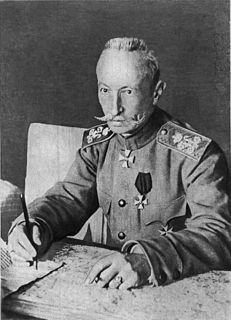Brusilov (Russian: Брусилов) or Brusilova (feminine; Брусилова) is a Russian surname originating from the verb brusit meaning mumble. [1] Notable people with the surname include:
- Aleksei Brusilov (1853–1926), Russian cavalry general
- Brusilov Offensive, Russian offensive during World War I
- Georgy Brusilov (1884–c.1914), Russian naval officer and Arctic explorer
- Brusilov Expedition in 1912–1914
- Brusilov Nunataks in Antarctica

The Brusilov Expedition was a Russian maritime expedition to the Arctic led by Captain Georgy Brusilov, which set out in 1912 to explore and map a route from the Atlantic Ocean to the Pacific via a northeast passage known as the Northern Sea Route. The expedition was ill-planned and ill-executed by Brusilov, and disappeared without a trace. Earlier searches were unsuccessful, and the fate of the ship and its crew is still not known.
The Brusilov Nunataks are a group of nunataks lying 6 nautical miles (11 km) north of Mount Morrison in the Tula Mountains, Enderby Land. The geology of the nunataks was investigated by the Soviet Antarctic Expedition, 1961–62, which named them after the Russian polar explorer G.L. Brusilov.
- Lev Brusilov (1857–1909), Russian vice admiral and brother of Aleksei

Aleksei Alekseyevich Brusilov was a Russian general most noted for the development of new offensive tactics used in the 1916 Brusilov Offensive, which was his greatest achievement. The innovative and relatively successful tactics used were later copied by the Germans. Born into the aristocracy to a father who was also a general, Brusilov trained as a cavalry officer, but by 1914 he realized that cavalry was obsolete in the new style of warfare because of its vulnerability to machine gun and artillery. Historians portray him as the only First World War Russian general capable of winning major battles. However, his heavy casualties seriously weakened the Russian army, which was unable to replace its losses. During the offensive, he had a small numerical advantage, but in 72 hours advanced 50 miles, took 200,000 prisoners, and seized 700 heavy guns.

The Brusilov Offensive, also known as the "June Advance", of June to September 1916 was the Russian Empire's greatest feat of arms during World War I, and among the most lethal offensives in world history. Historian Graydon Tunstall called the Brusilov Offensive the worst crisis of World War I for Austria-Hungary and the Triple Entente's greatest victory, but it came at a tremendous loss of life.

Georgy Lvovich Brusilov or Hryhoriy Brusylov was a Russian naval officer of the Imperial Russian Navy and an Arctic explorer. His father, Lev Brusilov, was also a naval officer.









